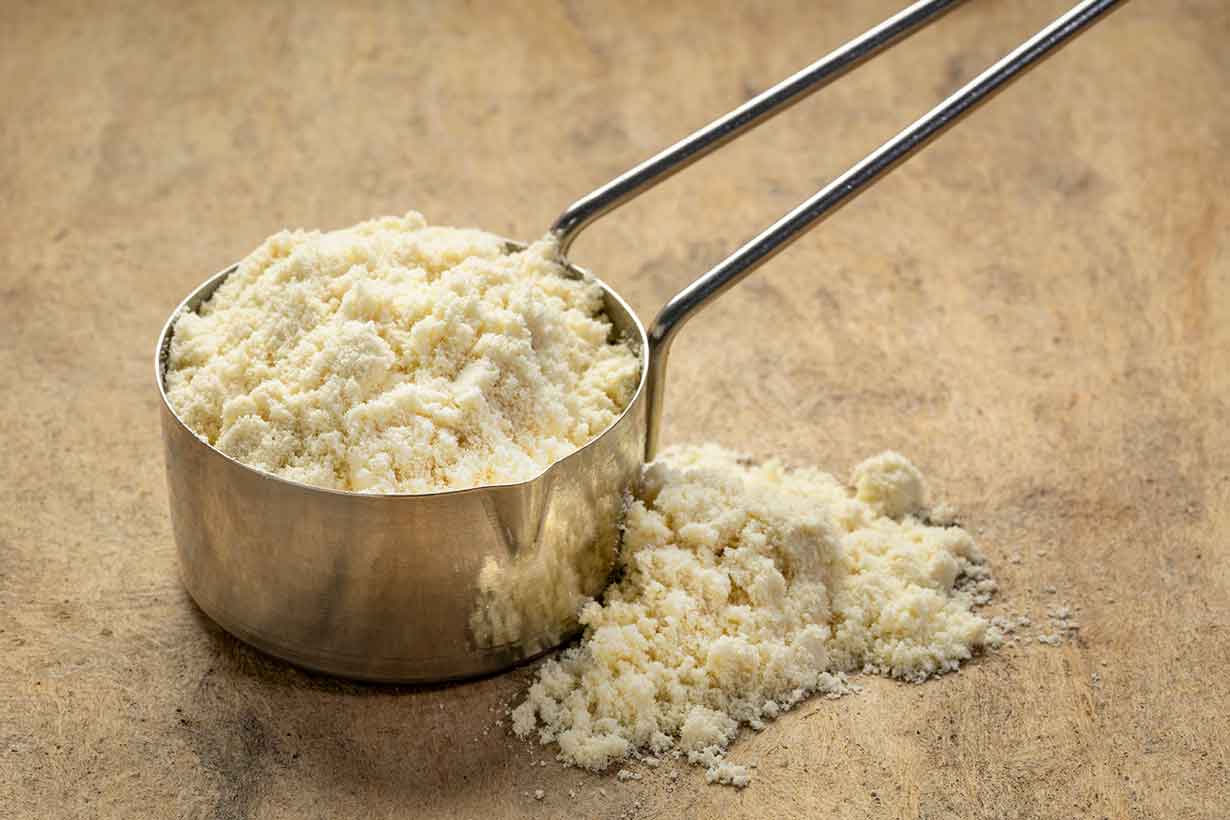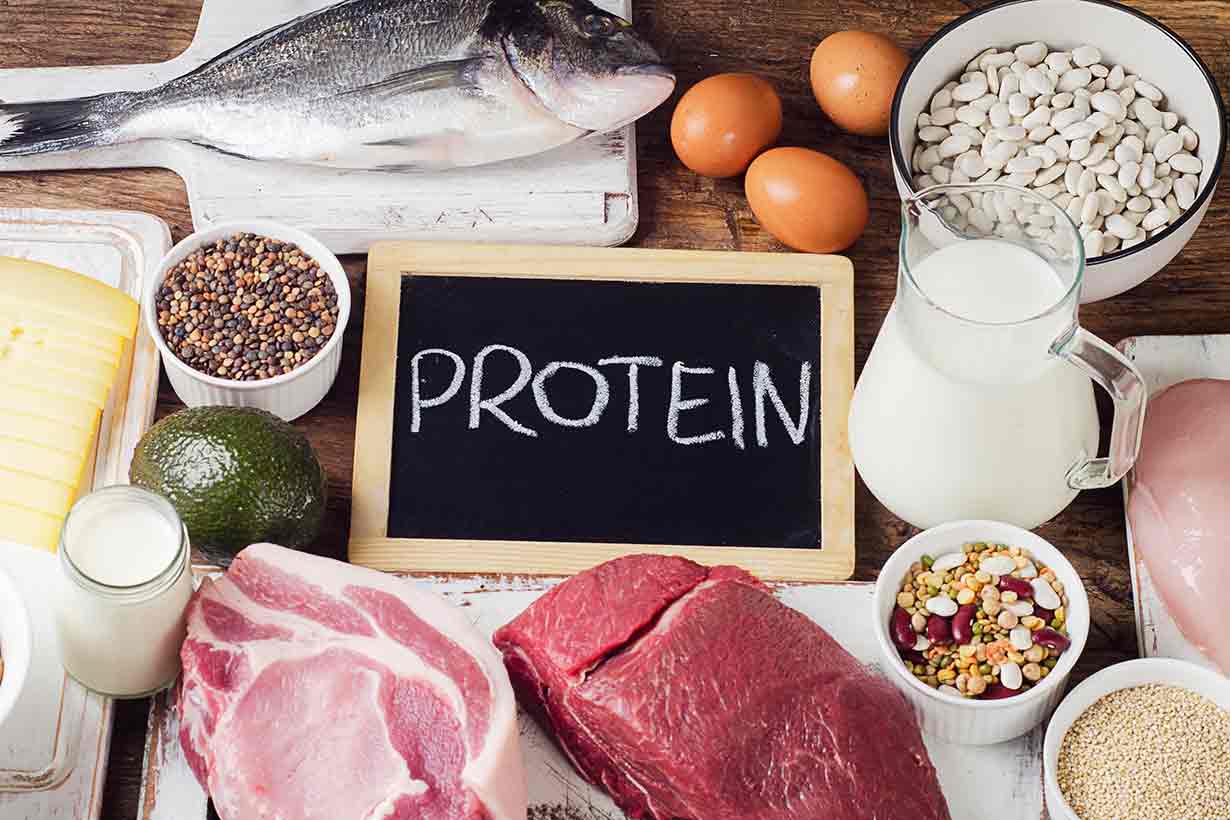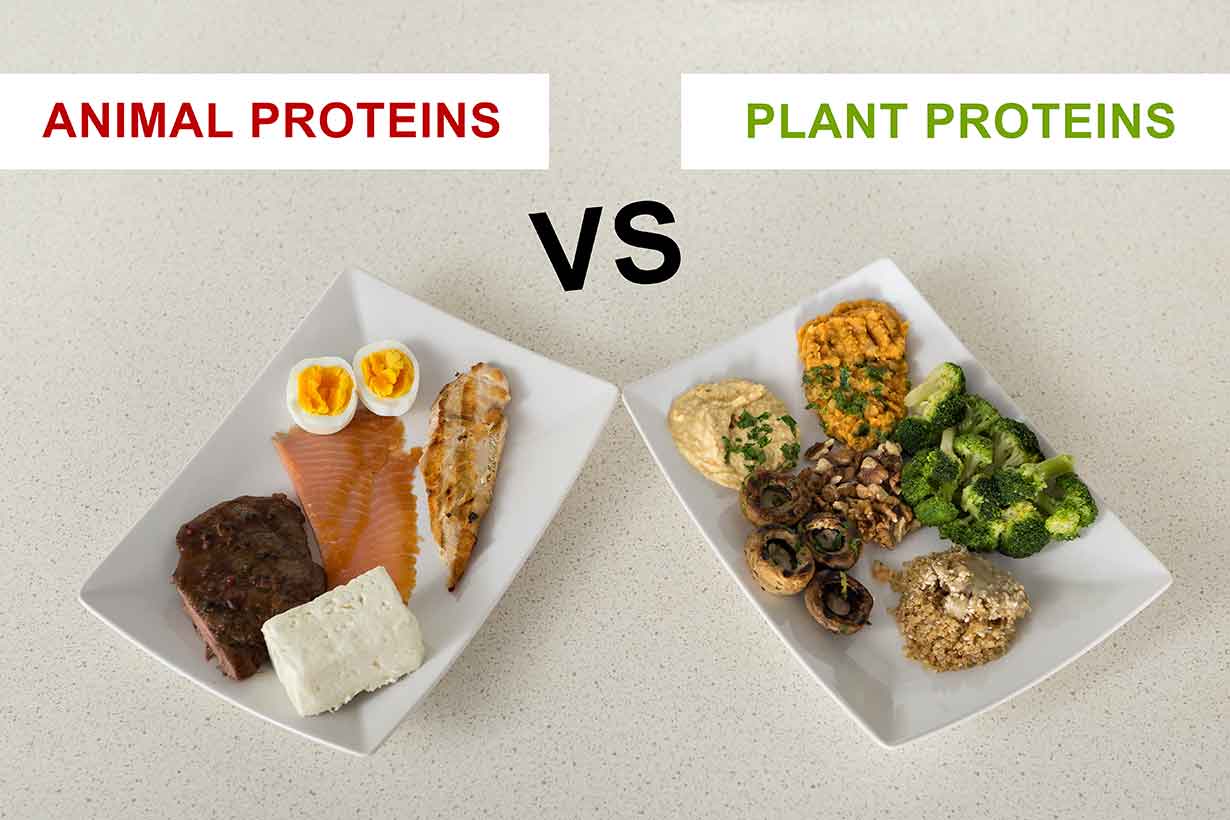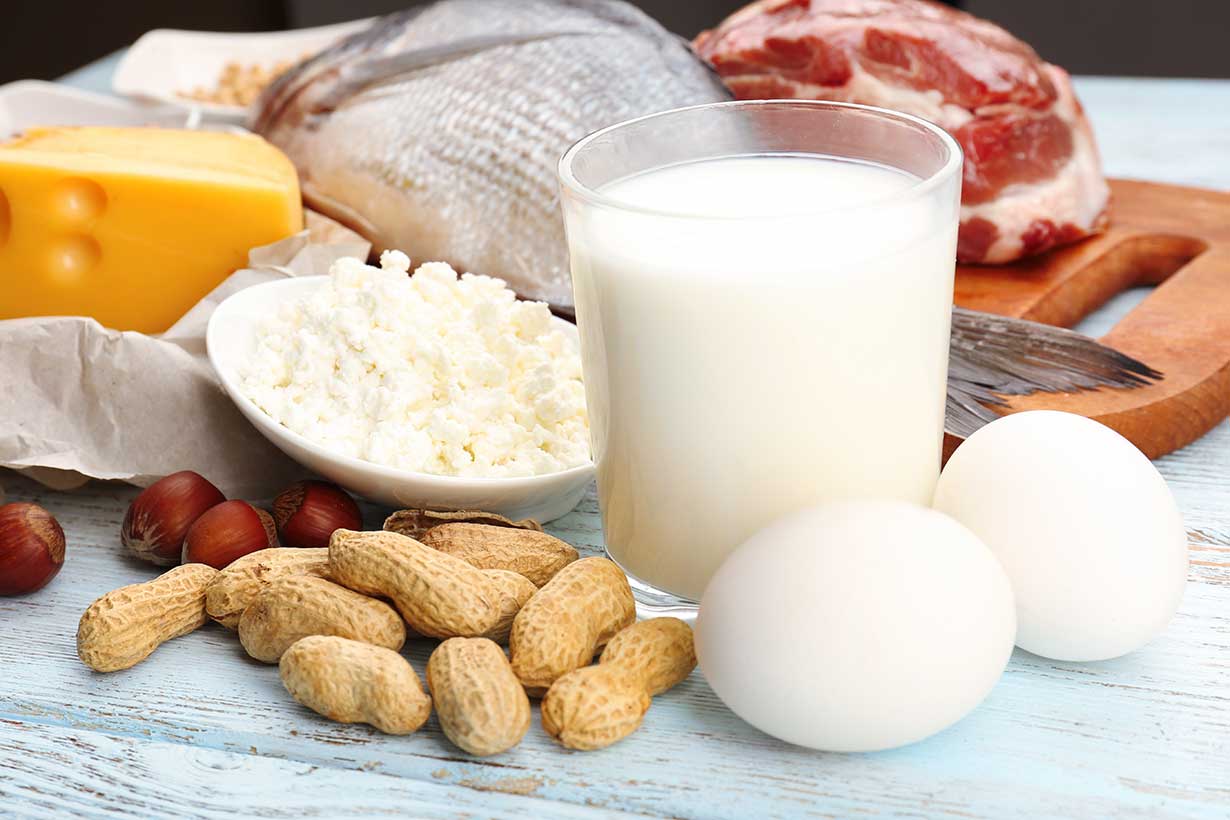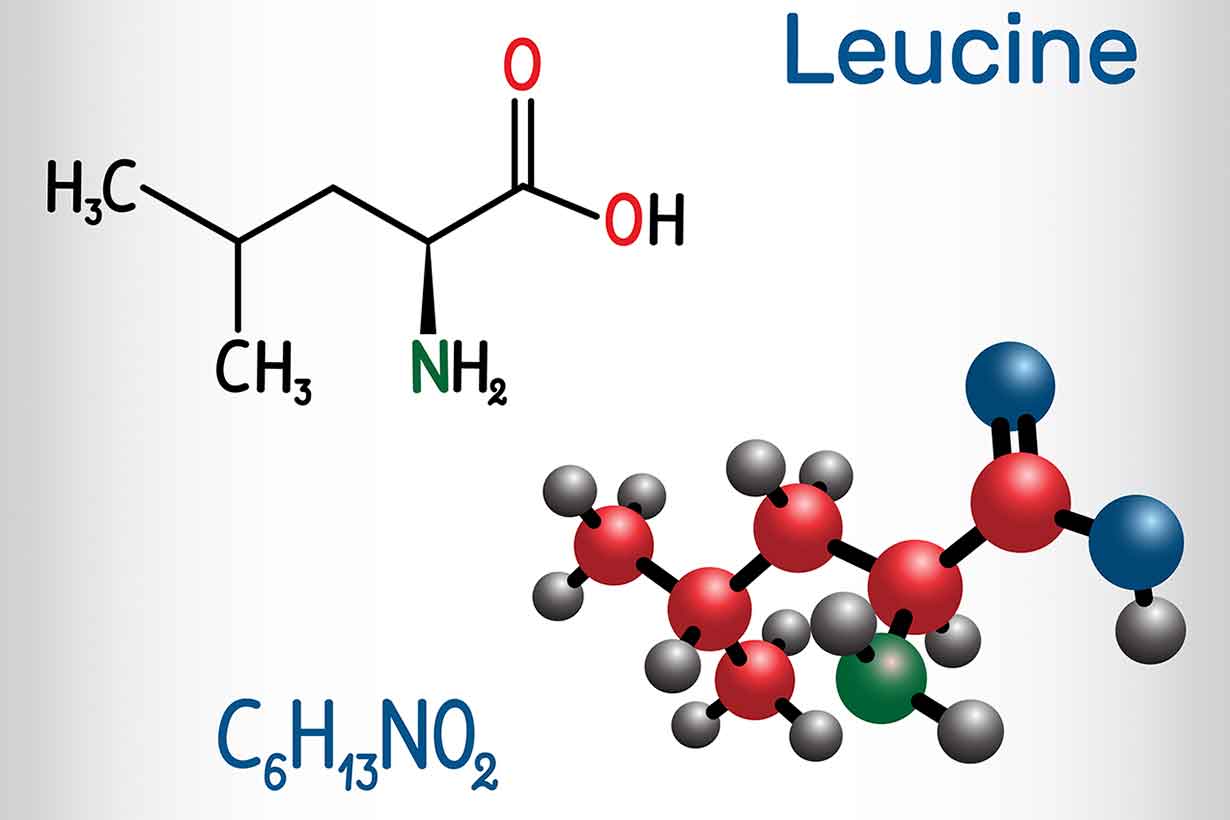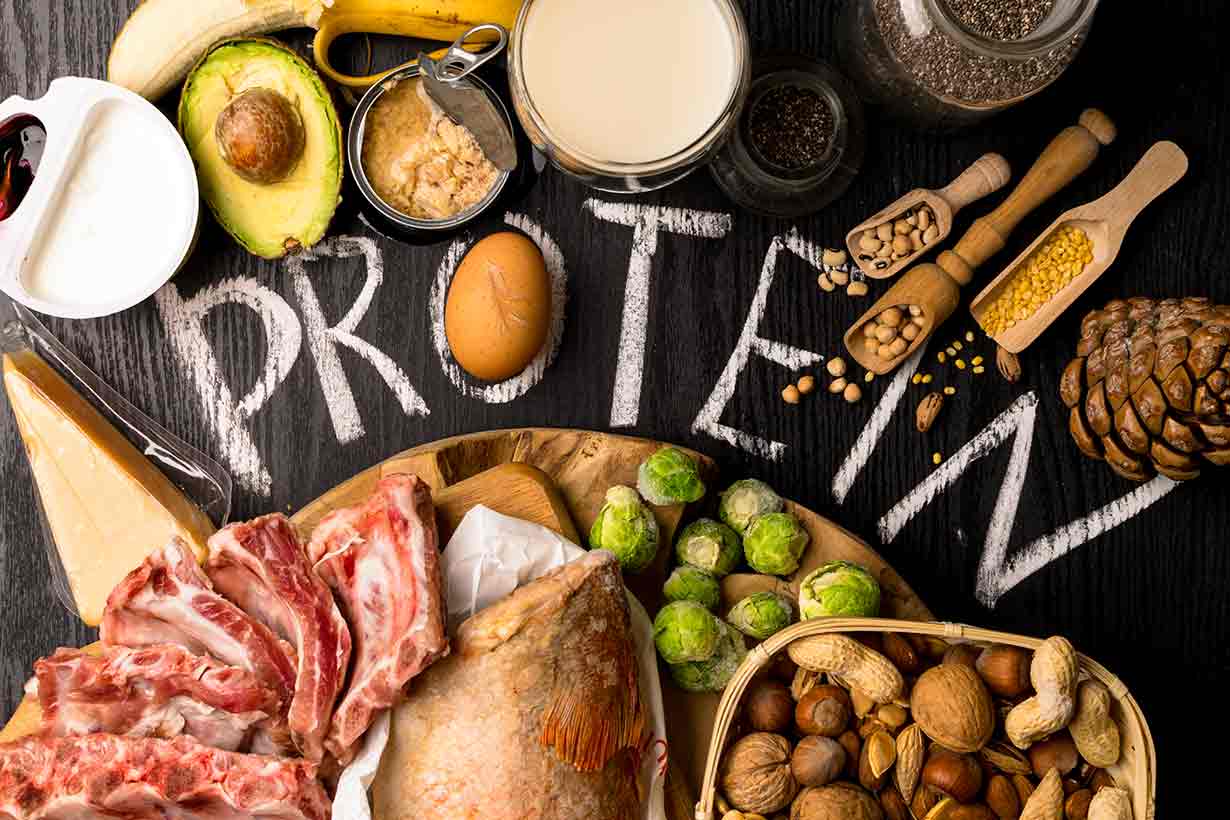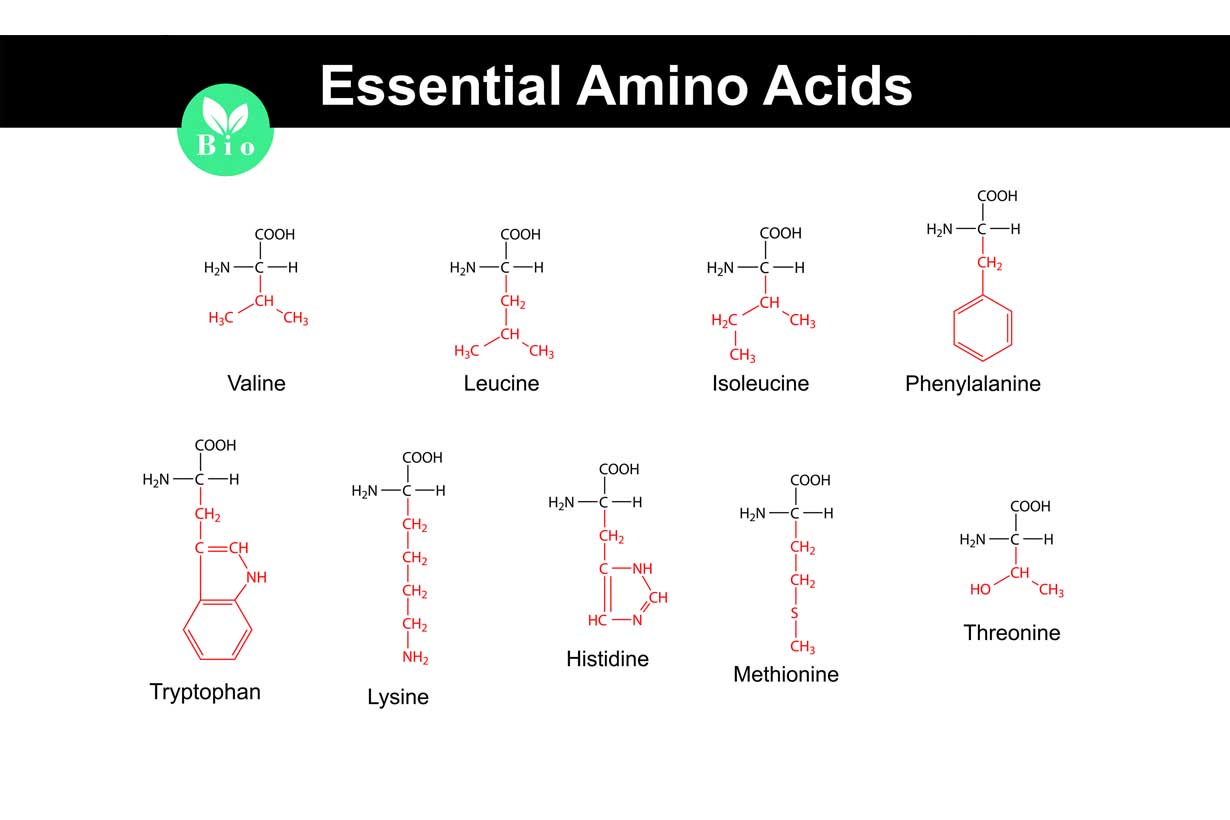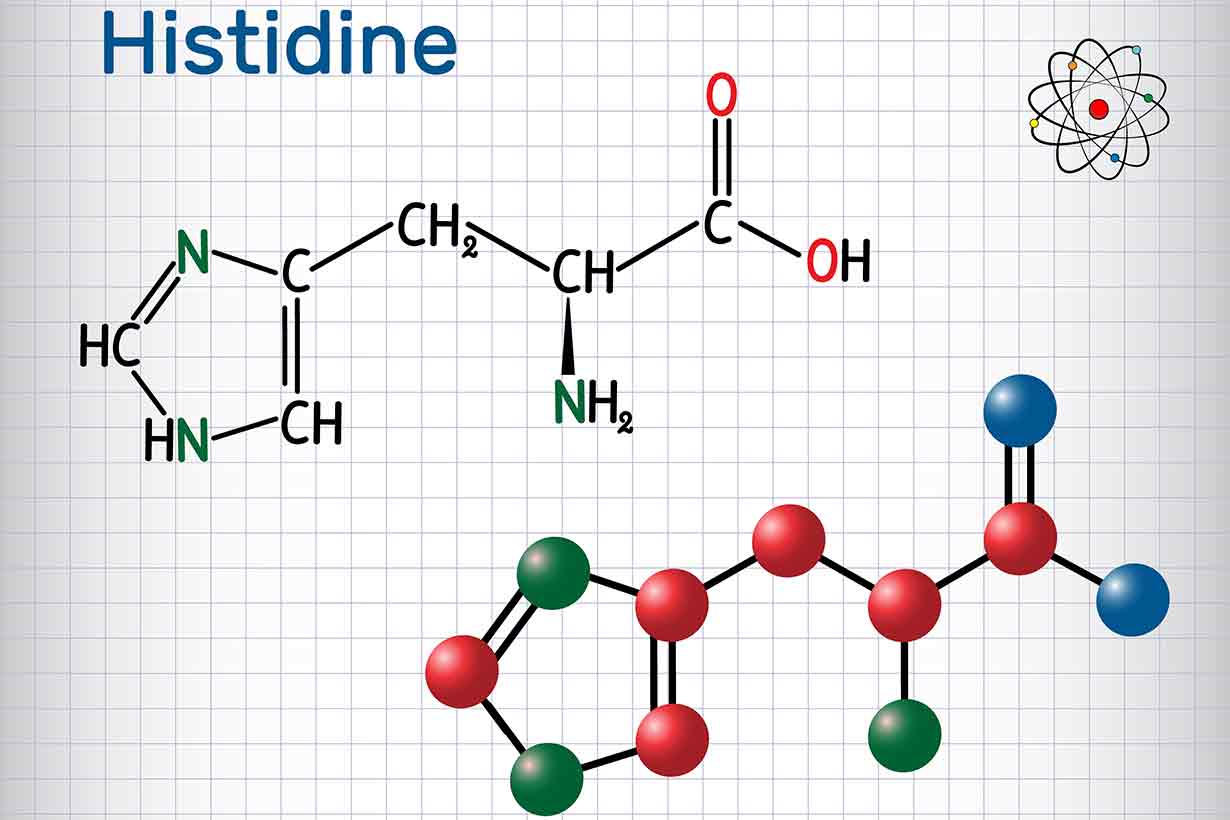Ensuring we consume a sufficient amount of protein to meet our daily protein needs is essential.
However, the precise amount of protein each individual requires is a nutrition issue where you may hear a wide range of opinions.
So, just how much protein do we need per day?
In truth, there is no one-size-fits-all response to this question, and it depends on the individual’s lifestyle, circumstances, and goals.
Drawing on the latest scientific research, this article examines how many grams of protein different individuals may need.
Before getting into specifics, let’s examine what protein is, and why it’s important.
Table of contents
What Is Protein?
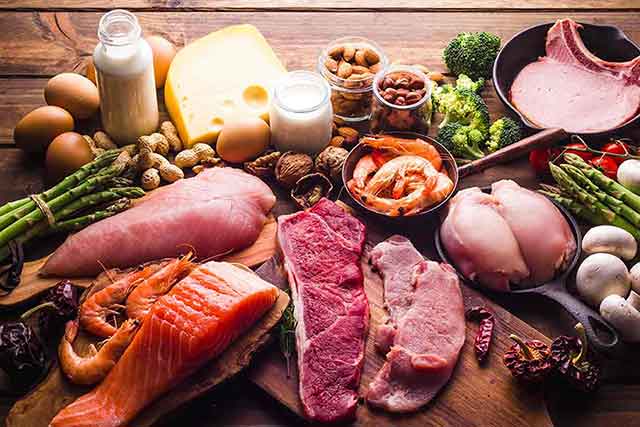
Protein is one of the three macronutrients, alongside carbohydrates and fat.
It has a large molecular structure, comprising numerous amino acids, each of which have varying bioactive effects.
We can break these amino acids down into three groups (1):
- Essential amino acids: since the body cannot make these acids by itself, we need to obtain them from our diet, hence their essentiality. These amino acids include histidine, isoleucine, leucine, lysine, methionine, threonine, tryptophan, phenylalanine, and valine.
See here for a full guide to essential amino acids:
Essential Amino Acids: Functions, Requirements, Food Sources
- Nonessential amino acids: Contrary to essential amino acids, these can be synthesized within the body. They include alanine, aspartic acid, asparagine, glutamic acid, and serine.
- Conditionally essential amino acids: While essential, these animo acids can usually be produced within the body. However, there are some contexts (such as illness) in which the body may not be able to produce sufficient amounts to meet requirements. Thus, they become essential during such circumstances. These amino acids include arginine, cysteine, glycine, glutamine, proline, and tyrosine.
Why Is Protein Important?
First of all, sufficient protein intake is vital for maintaining our health, and we need to obtain enough to support the optimal functioning of various bodily systems.
Protein plays several critical roles within the human body, including (2):
- Promoting bone and skeletal health
- Facilitating the proper functioning of various enzymes and hormones
- Fueling muscle growth and repair
- Bolstering immune function
- Contributing to the growth and repair bone, hair, muscle, skin, and various other tissues
Additionally, ensuring sufficient protein intake can play an important role in weight management by influencing satiety and appetite control (3, 4).
This is just a brief overview, and you can find a full guide to the benefits of protein in this article.
What Are the Best Sources?
Common protein sources include dairy, eggs, meat, fish, legumes, whole grains, nuts, and seeds.
Meat, fish, and legumes typically have the highest protein content among these foods. Animal-based proteins and soybeans, along with soy-based products, offer protein with the highest bioavailability (5).
See this guide to how animal and plant proteins compare for more information.
Additionally, a list of high-quality protein foods, can be found here.
For those specifically looking to boost their protein intake without adding a significant number of calories, lean protein options are the best choice.
For more on lean, lower-calorie protein options, see this guide:
27 Low-Calorie, High-Protein Foods
Also, this list of high-protein snacks for when you’re on the go may be useful:
33 High-Protein Snacks For When You’re On the Go
What Is the Recommended Protein Intake?
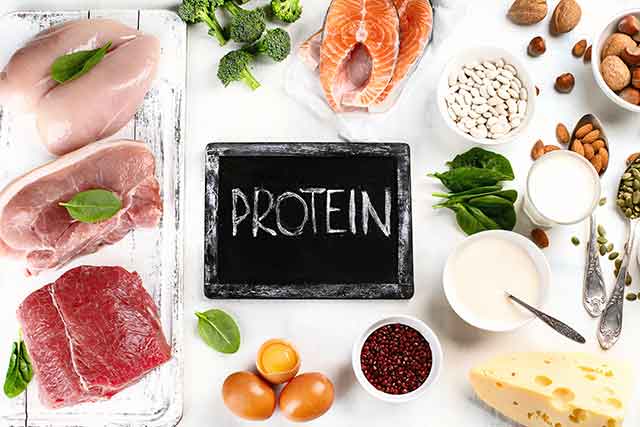
We can look to several sources for protein intake guidelines.
Recommended Dietary Allowance
The Institute of Medicine (IOM) provide guidelines on protein intake through the publication of Dietary Reference Intakes for protein, which includes the Recommended Dietary Allowance (RDA).
The RDA signifies the amount of protein sufficient to meet the needs of most individuals across the population.
The RDA is set at 0.80 grams of good quality protein per kilogram of body weight (6).
Therefore, the RDA for protein varies according to body weight, as shown below:
- 40 grams per day for an individual weighing 50 kg
- 50 grams per day for an individual weighing 63 kg
- 60 grams per day for an individual weighing 75 kg
It is crucial to recognize that the RDA is a minimum target to meet needs. In other words, it is the protein requirement necessary to support the body’s basic physiological needs and functions.
However, the RDA may not necessarily reflect the optimal amount of protein for each individual. Some may need substantially higher amounts of protein to meet their personal requirements.
We will look at this in further detail later on.
Do Physically Active Individuals and Athletes Need More Protein?

Athletes and those engaged in resistance training are two groups of people who may greatly benefit from a higher protein intake.
Preservation of Muscle Mass
While most people understand that protein helps with building muscle, increased protein intake can have further benefits for athletes.
Particularly notable is its role in preserving muscle mass during periods of energy restriction.
Athletes may often undergo weight loss phases, whether for overall sporting performance, making weight in sports that use weight categories, or bodybuilding objectives.
In such circumstances, it is critical that athletes preserve as much muscle mass as possible while losing weight. This is a situation where higher protein intakes may help.
Notable research findings on protein intake during caloric restriction:
- A systematic review examining dietary protein intake among lean, resistance-trained athletes revealed that protein needs may range between 2.3-3.1 grams of protein per kilogram of bodyweight, depending on the severity of caloric restriction and leanness (7).
- According to a position statement from the International Society of Sports Nutrition, increasing protein intake from the RDA (0.8 g/kg) to 1.2-2.4 grams per kilogram of body weight maximizes fat loss while helping to preserve muscle mass (8).
- Another review, published in the International Journal of Sport Nutrition and Exercise Metabolism, concluded that the RDA of 0.8 grams protein/kg/day isn’t optimal for preserving muscle mass during weight loss among athletes. The researchers proposed a recommendation of 1.6 – 2.4 grams of protein per kilogram per day within this context (9).
Resistance-Trained Individuals In General
Beyond weight loss contexts, increased protein consumption may be beneficial for resistance-trained individuals in general.
A systematic review and meta-analysis investigated the effect of protein supplementation on resistance-trained individuals. This review analysed data from 49 studies involving 1863 participants, with the results demonstrating that (10):
- Daily protein supplementation significantly promoted strength and muscle gain up to an overall protein intake of 1.6 grams per kilogram per day.
- Total protein intake over 1.62 grams per kg/day did not result in further gains.
It’s worth noting that this meta-analysis only included studies where participants met or exceeded their daily energy needs. In other words, these findings may not apply during energy-restricted weight loss phases.
While optimal protein intake for an individual differs depending on the overall diet, the sport, and training intensity, a higher protein intake than the RDA would be advantageous for many athletes.
Many athletes and resistance trainers use protein supplements to meet these increased intake requirements.
However, there are so many different types of protein out there.
Some of the available options are covered in this guide to the highest-quality protein powders.
Are There Any Specific Protein Requirements For Older Adults?

In recent years, studies have explored whether the RDA for protein adequately addresses the needs of older adults.
Here is an overview of their findings:
- A systematic review of protein intake in healthy elderly populations determined that 0.83 grams of protein per kilogram is the minimum requirement for healthy older adults. However, the authors note that this is the “minimum” and may not be optimal. Furthermore, that long-term studies indicate that intakes ranging between 1.2 and 1.5 grams of protein per kilogram is safe and beneficial (11).
- In a cohort of sixteen healthy adults aged over 60, a protein intake surpassing 1.08 grams per kilogram was found to maximize the body’s production of glutathione. Glutathione is a vital antioxidant crucial for immune function and protecting cells against free radicals (12, 13).
- Another 2017 review noted that current protein recommendations may not be sufficient for older adults. Additionally, it emphasized that older adults require higher leucine intake, an essential amino acid, to stimulate muscle protein synthesis (14).
- A systematic review found that low protein intake exacerbates frailty in the elderly, underscoring the need for increasing protein intake among older adults (15).
- Numerous studies highlight that higher protein intakes beyond the RDA in older adults to support strength and function while reducing the risk of frailty, falls, and all-cause mortality (16, 17, 18).
Why Do the Elderly Have Greater Protein Needs?
For anyone wondering why older adults may have a higher protein requirement, it primarily stems from the aging process.
With advancing age, the rate of muscle protein synthesis (MPS) declines (19).
Put simply, this means that the amount of protein older adults can digest, absorb, and use is typically not as high as seen in younger adults.
In this case, an imbalance between incoming and the body’s protein requirements can accelerate muscle loss.
Furthermore, if an individual is consuming insufficient protein over the longer-term, certain signs of deficiency may start to show.
Studies support increased intake for muscle protein synthesis
- In a randomized controlled trial, healthy adults consuming 1.5 grams of protein per kilogram exhibited significantly higher whole-body net protein balance compared to those consuming 0.8 grams per kilogram (20).
- Optimal muscle protein synthesis occurs with a protein intake of 25-30 grams per meal or more, while intake below 20 grams blunts this process (21).
Additionally, physical exercise, particularly resistance training, stimulates greater rates of muscle protein synthesis (22).
Is There An Official Protein Recommendation For Older Adults Aside From the RDA?
While the Institute of Medicine’s RDAs remain consistent across age groups, the European Society for Clinical Nutrition (ESPEN) has issued recommendations tailored to older adults.
After systematically reviewing the evidence, ESPEN states that (23):
- Daily protein intakes between 1.0-2.0 grams per kilogram have been suggested, with the range depending on health status.
- Scientific evidence from intervention trials is currently insufficient to provide exact protein quantity recommendations.
- Until clear evidence is available, “an intake of at least 1.0 g/kg should be ensured in all older persons” (23).
Higher Protein Intake May Help With Weight Loss
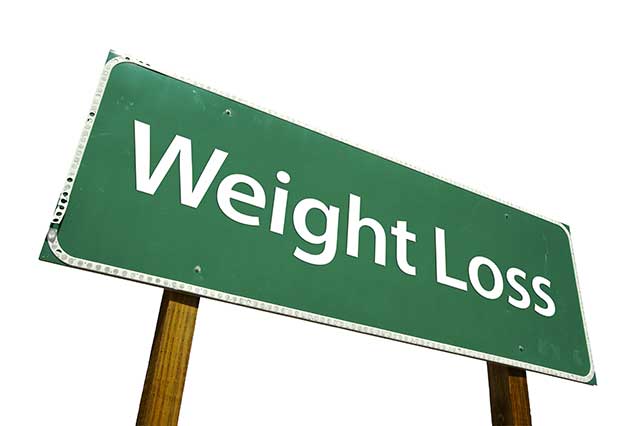
Another group that may benefit from a diet higher in protein are those aiming to lose weight.
Protein has a range of characteristics that lend to its potential conduciveness to weight loss efforts:
- Protein tends to have the highest satiety-promoting effect out of the three macronutrients, potentially reducing food cravings and overall energy intake (24).
- Interestingly, protein exerts a slight thermic effect, meaning that the body uses more energy (hence calories) to metabolize protein compared to other macronutrients. Consequently, a high-protein diet may elevate metabolic rate and energy expenditure, facilitating weight loss (25, 26, 27).
- Various systematic reviews and meta-analyses have demonstrated appetite-controlling and weight loss benefits for higher protein diets compared to lower-protein control diets (28, 29, 30).
Weight loss essentially comes down to consuming less energy, but that is not the full story.
The broader picture is whether our diet and lifestyle foster conditions conducive to reducing food intake, and protein may help with this by promoting satiety.
Can Too Much Protein Be Harmful?
In this article, we have learned that some individuals may benefit from increasing their protein intake.
However, is there a point when protein intake becomes too much? And can too much protein potentially cause harm?
Firstly, it is important to note that high protein intakes can have a negative effect on the kidneys in people with kidney disease. This is because reduced kidney function impairs the efficient processing of urea and other waste products of protein metabolism (31, 32).
However, evidence is lacking for protein being harmful to the kidneys in otherwise healthy individuals.
On this note, a study led by Dr. Jose Antonio at the International Society of Sports Nutrition found no adverse effects from adhering to a very-high-protein diet over a one-year period (33).
In this study, participants consumed between 2.51 grams and 3.32 grams of protein daily, with comprehensive testing revealing no negative impacts on lipid (cholesterol) profiles, liver, or kidney function
Although the evidence suggests that higher protein intake of protein is better than a lack of it, it is possible to consume anything in excess – even water.
The same is true of protein.
In this regard, we can look to the Acceptable Macronutrient Distribution Range (AMDR) for further guidance.
Acceptable Macronutrient Distribution Range for Protein
The AMDR definition is “the range of intake for a particular energy source that is associated with reduced risk of chronic disease while providing intakes of essential nutrients” (34).
The AMDR for protein intake in the United States ranges from 10% to 35% of daily calories.
For a 2000-calorie diet, this equates to 50 grams (approx 200 calories) to 175 grams (700 calories) of protein.
Here is how the protein AMDR would look based on varying daily energy needs:
- 2200 calorie diet: 55-192 grams of protein
- 2500 calorie diet: 62-218 grams of protein
- 2800 calorie diet: 70-245 grams of protein
- 3000 calorie diet: 75-262 grams of protein
- 3500 calorie diet: 87-306 grams of protein
- 4000 calorie diet: 100-350 grams of protein
For those unsure about the protein content of food, a guide listing protein amounts among 230 common foods is available below.
The Protein Content of 230 Common Foods
Final Thoughts
Maintaining an adequate protein intake tailored to individual needs can have various positive impacts on our health.
The RDA serves as a baseline requirement, with higher intakes likely being beneficial for several groups of people, particularly older adults and resistance-trained individuals.
Consuming this essential macronutrient in sufficient amounts plays an important role in supporting satiety, body composition, and muscular and skeletal health.
References
- https://medlineplus.gov/ency/article/002222.htm
- https://medlineplus.gov/genetics/understanding/howgeneswork/protein/
- https://pubmed.ncbi.nlm.nih.gov/32768415/
- https://pubmed.ncbi.nlm.nih.gov/32648023/
- https://www.ncbi.nlm.nih.gov/pmc/articles/PMC6723444/
- https://nap.nationalacademies.org/read/10490/chapter/12
- https://pubmed.ncbi.nlm.nih.gov/24092765/
- https://jissn.biomedcentral.com/articles/10.1186/s12970-017-0177-8
- https://pubmed.ncbi.nlm.nih.gov/29182451/
- https://www.ncbi.nlm.nih.gov/pmc/articles/PMC5867436/
- https://www.ncbi.nlm.nih.gov/pmc/articles/PMC3926464/
- https://pubmed.ncbi.nlm.nih.gov/38325765/
- https://www.ncbi.nlm.nih.gov/pmc/articles/PMC4684116/
- https://pubmed.ncbi.nlm.nih.gov/28534027/
- https://www.ncbi.nlm.nih.gov/pmc/articles/PMC6165078/
- https://bmcgeriatr.biomedcentral.com/articles/10.1186/s12877-023-04173-w
- https://www.ncbi.nlm.nih.gov/pmc/articles/PMC8978023/
- https://pubmed.ncbi.nlm.nih.gov/29590270/
- https://www.physiology.org/doi/full/10.1152/japplphysiol.91551.2008
- https://www.physiology.org/doi/full/10.1152/ajpendo.00382.2014
- https://www.ncbi.nlm.nih.gov/pmc/articles/PMC2760315/
- https://www.ncbi.nlm.nih.gov/pmc/articles/PMC3289515/
- https://pubmed.ncbi.nlm.nih.gov/30005900/
- https://www.ncbi.nlm.nih.gov/pmc/articles/PMC7539343/
- https://pubmed.ncbi.nlm.nih.gov/28443785/
- https://www.ncbi.nlm.nih.gov/pubmed/15507147/
- https://www.ncbi.nlm.nih.gov/pubmed/11063440/
- https://pubmed.ncbi.nlm.nih.gov/25926512/
- https://pubmed.ncbi.nlm.nih.gov/34579069/
- https://pubmed.ncbi.nlm.nih.gov/26883880/
- https://www.kidney.org/atoz/content/ckd-diet-how-much-protein-right-amount
- https://www.kidneyfund.org/all-about-kidneys/other-kidney-problems/protein-urine
- https://www.ncbi.nlm.nih.gov/pmc/articles/PMC5078648/
- https://www.nal.usda.gov/sites/fnic.nal.usda.gov/files/uploads/macronutrients.pdf

